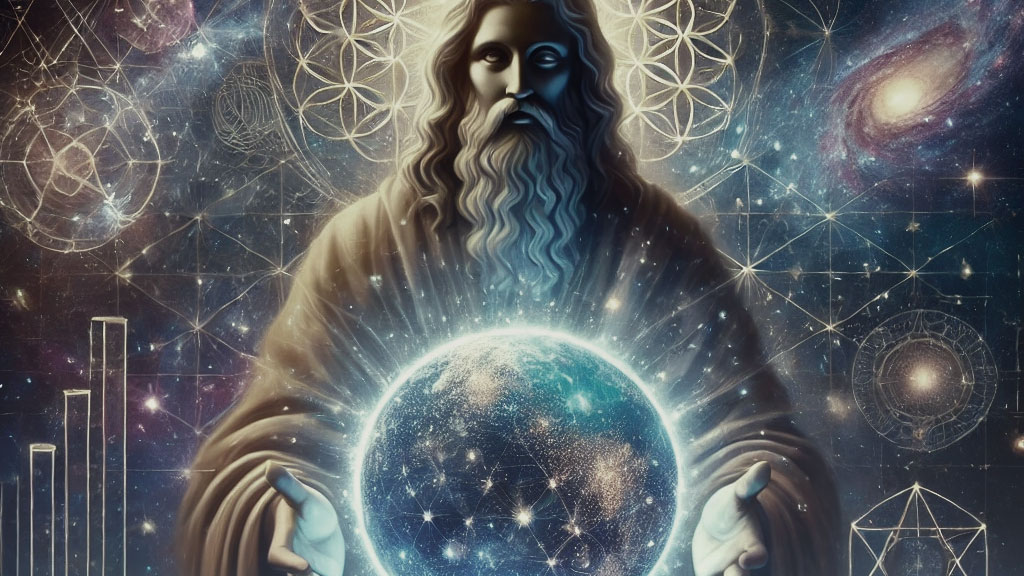In ancient philosophy, particularly within the framework of Neoplatonism, the concept of the Demiurge plays a pivotal role in explaining the creation and organization of the cosmos. Proclus, a renowned philosopher of late antiquity, dedicated much of his work to unraveling these metaphysical mysteries. In The Ten Gifts of the Demiurge, Emilie Kutash offers a deep dive into Proclus’ commentary on Plato’s Timaeus, illuminating the divine gifts that shape our understanding of reality.
This article will explore the ten gifts of the Demiurge, as presented in Kutash’s work, and explain their significance in simple terms.
Understanding the Demiurge
The Demiurge, as interpreted by Proclus, is a divine craftsman who brings order to chaos, shaping the cosmos through a series of gifts. These gifts are metaphysical tools, bestowed upon the universe to ensure its harmony and continuity. Each gift reflects a layer of reality, from the perceptible world to the divine realms beyond human understanding.
Let’s break down these ten gifts into more digestible insights:
1. Perceptibility
The first gift the Demiurge bestows is perceptibility. This refers to the ability of the universe to be perceived through the senses. Before the Demiurge’s intervention, the world was formless. By making it perceptible, the Demiurge allows for interaction through sight and touch, grounding the cosmos in the tangible.
2. Proportionality
The second gift is the bond of proportion, which binds all the elements of the cosmos. Proportion here is more than mathematical; it’s a cosmic harmony that ensures the balance between all things. Proclus emphasizes that the Demiurge uses proportions to bind different bodies in the universe, reflecting the importance of balance and order in the cosmos.
3. Wholeness
Proclus introduces the third gift as the concept of wholeness. The Demiurge doesn’t just organize disparate parts; he makes the cosmos a complete entity. The universe is a “whole made up of wholes,” a reflection of the ancient belief that every part of the universe is interconnected and meaningful within the larger system.
“Through the decad, he thus completes the entire creation.” – Proclus
4. Sphericity
The fourth gift bestowed by the Demiurge is the shape of the universe—perfectly spherical. The sphere, according to ancient cosmology, is the most perfect shape, representing unity and uniformity. The Demiurge shapes the cosmos into a sphere to ensure that it is most like itself in every respect, reflecting eternal harmony.
5. Self-sufficiency
This gift ensures that the universe is autonomous. It can undergo all necessary processes independently, without outside intervention. This self-sufficiency implies a cosmos that runs like clockwork, fueled by its own intrinsic mechanisms set in motion by the Demiurge.
6. Motion
The sixth gift relates to motion fitting to intellect. The Demiurge endows the cosmos with motion that reflects divine intelligence, ensuring that everything moves purposefully and in alignment with higher principles of order.
7. Animation
Through the seventh gift, the Demiurge breathes life into the universe by animating it with a divine soul. This soul permeates every corner of existence, infusing life, consciousness, and spiritual purpose into all beings.
8. Time
The eighth gift is the creation of time. Proclus explains that time is the moving image of eternity, a way for the cosmos to measure its movements and changes. Time, in this sense, is a gift that allows for the unfolding of events in a structured, intelligible manner.
9. Divine Sanctuaries
The ninth gift involves the establishment of divine sanctuaries within the cosmos. These sanctuaries are realms where the gods dwell, influencing the world below and ensuring that the universe adheres to divine will. Proclus calls this the formation of the perfect year, where all elements of existence are synchronized with the movements of the gods.
10. Completion
The final gift is the all-encompassing completeness of the cosmos. This completion comes from the Demiurge’s creation of all living beings in the likeness of the divine Forms, ensuring that everything within the universe reflects the perfection of its maker.
Proclus’ Vision of the Cosmos
Proclus’ interpretation of Plato’s Timaeus shows us a world crafted with precision and divine care. Through the ten gifts, the Demiurge creates a cosmos that is ordered, intelligible, and infused with life and purpose. These gifts remind us that the world is not random but a carefully structured entity, bound together by divine wisdom and mathematical proportion.
The Ten Gifts of the Demiurge is a fascinating study for anyone interested in metaphysics, philosophy, or ancient cosmology. Emilie Kutash’s work offers a profound exploration of these gifts and their implications for how we understand the universe.
Discover More
For those intrigued by the metaphysical insights explored in this article, The Ten Gifts of the Demiurge by Emilie Kutash is available for purchase on Amazon. This book provides a comprehensive analysis of Proclus’ commentary on Timaeus and offers a deep dive into ancient philosophical cosmology.
Cathar Perspective vs. Proclus and Emilie Kutash on the Demiurge
It is worth noting that while Proclus and Emilie Kutash explore the Demiurge as a benevolent, divine craftsman responsible for creating order and life in the cosmos, the Cathars had a starkly different view. For the Cathars, the Demiurge was seen as a malevolent entity, responsible for trapping souls in the material world. In contrast to Proclus’ divine gifts, the Cathar Demiurge was associated with deception and suffering, creating a world that was imperfect and inherently evil. This divergence in interpretation reflects the broader theological differences between Neoplatonism’s metaphysical optimism and the dualistic worldview of the Cathars, where the material world is a realm of imprisonment rather than divine order.




